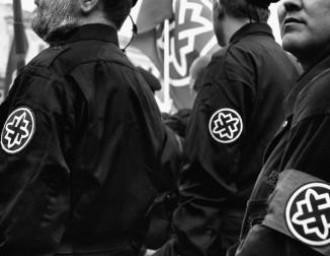Piotr Kuzniatsou: Belarusan authorities find neo-Nazis ideologically similar to them

Russian groups of neo-Nazi character share common ideological platform with the Belarusan authorities and promote the atmosphere of fear in the Belarusan society.
In such a way the coordinator the Movement for Freedom in Gomel region and the head of the civil initiative “Gomel Democratic Forum” Piotr Kuzniatsou explained quite loyal attitude of Belarusan authorities towards the representatives of radical right-wing movements from Russia in the talk with the EuroBelarus Information Service.
Let us recall that at the end of February Russian radical right-winger Maksim Martsinkevich (also known as “Tesak”) and his fellow-fighter Sergei Korotkich (also known as “Maliuta”), both suspected of malicious hooliganism were bailed from the detention center, bound over to appear.
“In order to comment upon such actions of the authorities, we should either possess certain information or speculate and guess, - noted Piotr Kuzniatsou. – Now Internet is full of rumors and suppositions that these neo-Nazis work with special services and, perhaps, have participated in certain enforced actions against opposition. And if they work for special services, then, of course, they won’t give away their own forces”.
If we proceed from the reliable information, then, according to the head of the “Gomel Democratic Forum”, we should proceed from the fact that as far back as the 90s, when the idea of common state with Russia was dominating among Belarusan authorities, neo-Nazis organizations with their platform about the unity of all Slavic people were similar in ideology to the Belarusan authorities.
“Under Stalin times there was a notion of “ideologically congenial” – a characteristic often used to describe criminals. And Belarusan authorities treat neo-Nazis as ideologically congenial in the least – people, who are against Western values, stand for tough political regime, and have ideology that presupposes some special role for Slavic people”, - explained Piotr Kuzniatsou.
And even now, when Belarusan authorities’ impulses for integration have considerably calmed down, hostility towards Western values remains their common ideological platform with neo-Nazi groups in Russia.
Besides, our authorities seek to preserve the atmosphere of fear in the society, recalled the head of the “Gomel Democratic Forum”: “And neo-Nazis, with their renowned features and public image that is inseparably connected with violence, is very convenient for the authorities. As neo-Nazis are dangerous for the people who stand for free and democratic country’s development”.
At the same time radical right-wing movements perform those functions that the authorities are not always ready to carry out themselves being restricted by law: “If in certain cases one can get somebody else to do his dirty work, why not use it?” – Piotr Kuzniatsou asked the question that requires no answer.
But can in happen so now convenient “neo-Nazi spirit” will become uncontrollable in the future?
Piotr Kuzniatsou finds this variant highly impossible: “Belarus has very few appeals for aggressive youth subcultures. Even the case with Tesak can serve as an example, as it is connected with his arrival from Russia”, - noticed the interlocutor.
He also recalled that for now the authorities successfully control citizens with much bigger opposition sentiments. “And neo-Nazi groups even due to the historic reasons are highly marginalized in Belarus and have few prerequisites for the development of their actions. All the more the authorities will manage to control them”, - assumes Piotr Kuzniatsou.
-
03.01
-
07.10
-
22.09
-
17.08
-
12.08
-
30.09








































